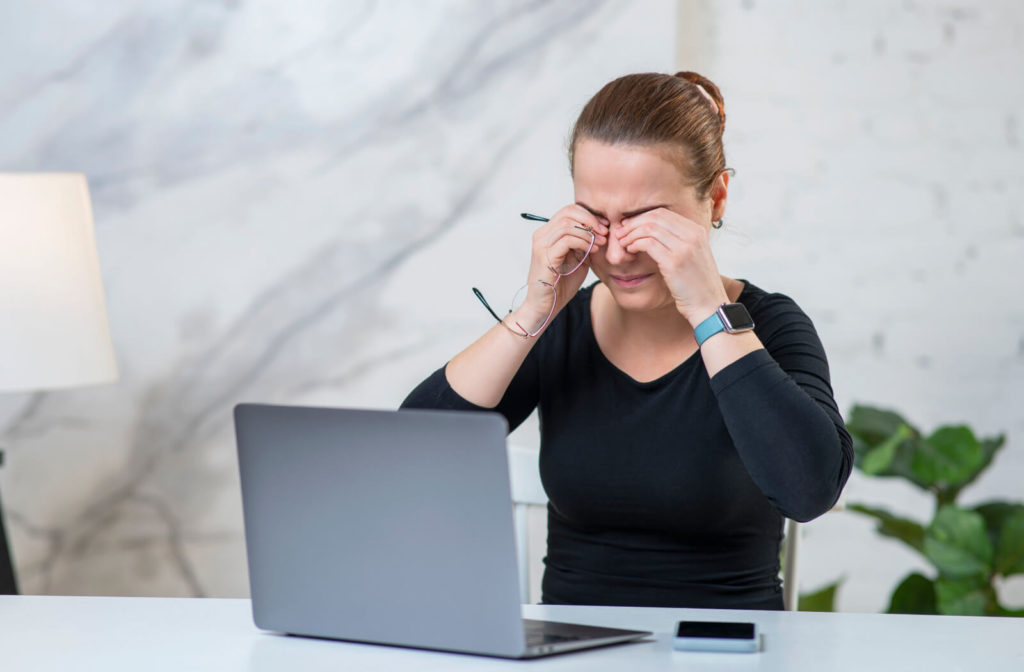Dry eye is a common disease that typically affects a person’s ability to produce tears, or the quality of their tears. Without proper lubrication, your eyes may experience various symptoms, including blurry vision.
At Seal Beach Eyes Optometry, our experienced doctors offer several treatment plans that are intended to combat the dry eye condition and its symptoms. Please read our full blog below to learn more about dry eyes and the available treatment options.
What Is Dry Eye?
Dry eye is a common condition that affects millions of Americans each year by impacting the eye’s ability to produce tears.
Tears are important for keeping our eyes lubricated and smooth, which helps us to focus light and see clearly. They also help protect against bacteria and infection from any dirt or dust that might accidentally enter your eyes.
Symptoms of Dry Eye
Suppose your eyes are producing low-quality tears or not enough tears. In that case, you may experience blurry vision or other symptoms associated with dry eyes.
Here are a few of the other symptoms that can result from the condition:
- Itchiness, stinging, or burning sensation in your eyes
- Mucus in or around your eyes
- Increased sensitivity to light
- Redness or watery eyes
- Blurred or shadowy vision
What Causes Dry Eye?
Many conditions and factors exist that can result in dry eye and cause an increase in tear evaporation. Here are a few of those common contributors to dry eye:
- Allergies
- Extended periods of screen time
- Aging
- Certain medications
- Certain autoimmune diseases
- Environmental conditions
How to Treat Dry Eye?
In many cases, a mild dry eye condition can be treated without prescription medication but through artificial tears, which can relieve discomfort and help promote healing.
Here are a few of the common treatment methods that are actively being used today:
Artificial Tears
Artificial tears are designed to replicate real tears and help to alleviate some of the symptoms experienced by dry eyes.
Prescription Medication
If artificial tears aren’t working, your doctor may recommend prescription medication or eye drops as a treatment option.
Warm Compress
A warm compress is done by soaking a clean washcloth and laying it over your eyes. It may relieve discomfort and soften any clogged oil that might have collected on your eyelids.
Lifestyle Changes
Lifestyle changes like spending less time looking at a screen, quitting smoking, and following healthy hygiene practices can help to reduce dry eye symptoms.

How Is Dry Eye Diagnosed?
Dry eye is a common condition and can be experienced during different stages of life. Below are a few of the tests your doctor might use to identify it.
Comprehensive Eye Exam
A regular comprehensive eye exam allows your doctor to examine the overall health of your eyes and watch out for any abnormalities, like dry eyes.
Measuring Your Tears
A Schirmer test is typically used to measure the number of tears being produced in your eye. A low number of tears likely signals that the condition is present. If your doctor notices dry eye symptoms, they may recommend performing this test.
Measuring the Quality of Your Tears
Your doctor may prescribe a test that measures how quickly your tears evaporate. Tears that evaporate quickly are of lower quality and might indicate you have a dry eye condition.
Osmolarity Test
An osmolarity test can help your doctor to learn more about the particles in your tears. If you have dry eyes, they will typically have less water present.
How to Prevent Dry Eye?
Dry eyes can be a nuisance caused by our environment, allergies, lifestyle, and many other reasons. Here are a few ways that you can help to prevent dry eye from happening in the first place:
Use a Humidifier
Home heating can be necessary during a cold winter, but it can also cause your home and eyes to dry out. By using a humidifier, you can bring back some moisture to the air and help keep your eyes safe.
Rest Your Eyes
Spending prolonged periods looking at a screen or focusing on something intensely can result in dry eyes. Therefore, it is important to take breaks periodically and give your eyes the rest they need.
Omega-3 Fatty Acids
Some studies and people have reported that omega-3 fatty acids like fish oil or flax seeds have helped with dry eye symptoms. Talk with your doctor and consider adding some of these foods to your diet.
Avoid Smoking
Smokers are twice as likely to get dry eyes, as cigarette smoke is known to lead to the condition. By avoiding smoking, you can reduce the risk of getting the disease or having symptoms act up.
Know When to Get Help
If you are experiencing discomfort from dry eyes or having difficulty completing day-to-day tasks, seek professional help and book an appointment with your doctor.
At Seal Beach Eyes Optometry, our friendly staff are happy to discuss treatment options and what you can do to work towards healthy eyes.




